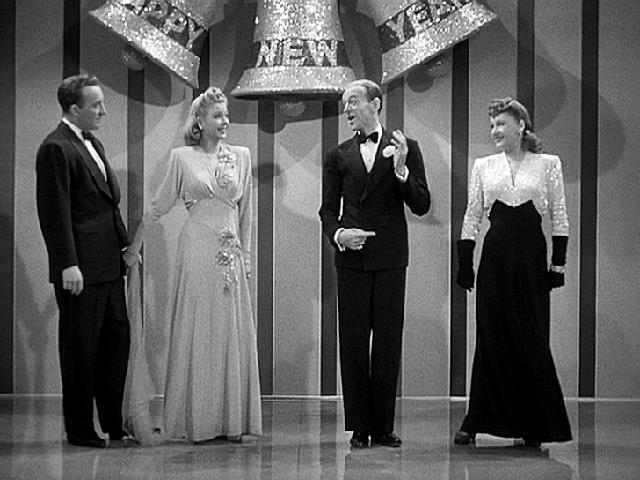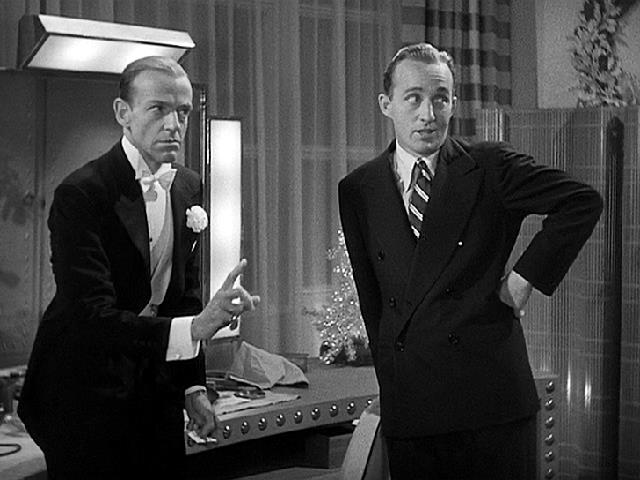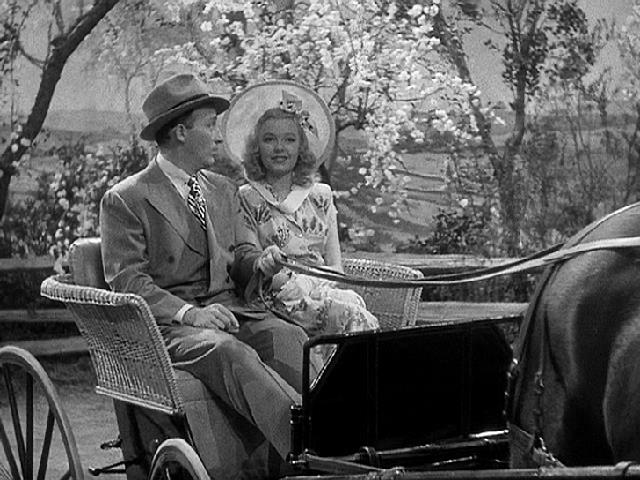For reasons that I can’t fathom, Holiday Inn has been overtaken by Michael Curtiz’s White Christmas (1954) as the default Bing Crosby holiday movie. Maybe it’s because it’s in color, or because Paramount promotes it. (Though made by Paramount, Holiday Inn is now owned by Universal.) Possibly it’s that White Christmas doesn’t have that blackface number. I’d prefer not to believe that there are people in this world who’d rather watch Danny Kaye (who always makes me yearn for a tranqulizer gun) than Fred Astaire. The truth, I suspect, is that it’s the title more than anything. I mean calling it White Christmas makes it obvious that it’s the movie with the song.
That’s unfortunate, because White Christmas is a plodding bore of a movie — and not just because of the Danny Kaye factor. Mark Sandrich’s Holiday Inn is another matter altogether. It’s bright. It’s breezy. It’s fun. It’s directed by someone who actually understands musicals. And it actually has a pretty solid screenplay. That last is not only key, but it’s surprising when you consider that the whole thing was Irving Berlin’s idea — a movie showcasing a flock of his songs. This wasn’t the first time Berlin came up with this concept, but it’s the one that worked best. It still does. To see the formula where it doesn’t work you need look no further than 1946’s Blue Skies, which reteamed Crosby and Astaire. It’s tempting to think that Blue Skies would have worked had Mark Sandrich not died during pre-production — and it probably would have been better — but the story would still have been one soapy slog.
Since I’ve already outlined the plot of Holiday Inn, let’s concentrate instead on the film’s many delightful touches. First off, while it rarely goes for the big laughs, it’s unfailingly witty. It may be the only film where Crosby is given a partner — who isn’t Bob Hope — who comes close to matching or complementing his style. Next to Hope, Astaire — at least here — has the best rapport of any of his co-stars. Apart from the showcase numbers at the Inn, the songs never bring the movie to a halt. “White Christmas,” for example, is handled with charming simplicity as part of the story. “Easter Parade” — a delightful slice of studio artistry — is almost thrown away as a transitional number. “I’ve Got Plenty to Be Thankful For” — one of those songs about the virtues of having nothing, written and sung by millionaires — is used for amusement with Bing cracking wise to a recording of it. Holiday Inn never forgets that it’s a movie first and a collection of songs second. And then there’s the tricky one — “Abraham” — that’s not only done in blackface, but particularly exagerrated blackface. Even looked at in the context of its time — and taking into account that it’s a ruse to keep Astaire from recognizing Marjorie Reynolds — it’s uncomfortable. But it’s hardly enough to sink this delightful and charming movie.






Before you comment
The comments section is here to provide a platform for civil dialogue on the issues we face together as a local community. Xpress is committed to offering this platform for all voices, but when the tone of the discussion gets nasty or strays off topic, we believe many people choose not to participate. Xpress editors are determined to moderate comments to ensure a constructive interchange is maintained. All comments judged not to be in keeping with the spirit of civil discourse will be removed and repeat violators will be banned. See here for our terms of service. Thank you for being part of this effort to promote respectful discussion.